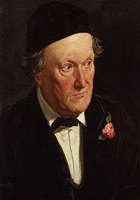Teliessin Poem by William Bell Scott
Teliessin
Once on a time, as stories tell,
Teliessin, Cymric master-bard,
Leant o'er the fire in the bardic hall,
Thinking of the ills that fall
On a small people nigh a great;
Ills waxen measureless of late,
Since his master's passing bell
Passed the mountain road so hard;
The road to an untimely grave,
Untimely to the good and brave.
The dying embers flickered down,
In from the night dry leaves had blown,
When a faint sound his ear doth greet,
That makes him rise upon his feet.
Was it the disused wires that rung,
Of some old harp by night-wind swung,
Within this bardic cloister hung?
It was not wind, no blasts now blow,
But gently first, and sweetly slow,
His master's harp from that high wall,
Preluded, rose to battle call,
Then changed by moaning fainting fall
Into the dirge wherewith the bard
Passed that mountain road so hard.
Teliessin turned, but nought could see,
Cried out,—‘Come, Master, come to me!’
A strange, far-off dear voice replied,
‘Come thou, come over to this side
There are harpers brave and good
In the heart of God's great wood
Son Teliessin, come away.’
‘Master dear,’ the young man cried,
‘I am ready, show the way!’
This was the day
Ten years ago the master died;
This was the darkening hour also,
Teliessin left both friend and foe.
Nor ever from that night agen
Hath he been seen by mortal men.
This poem has not been translated into any other language yet.
I would like to translate this poem